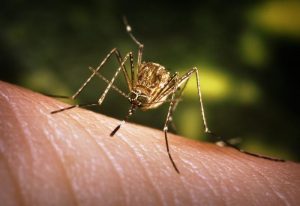New York City health officials have reported the first human West Nile virus (WNV) case of the year in a Manhattan resident. The patient, who is over 50 years of age, was hospitalized earlier this month with encephalitis and has since been discharged.

The Health Department notes that this is the earliest identification of a human case of WNV in New York City since surveillance began in 1999. Human cases of West Nile virus occur each year in New York City, and most cases are identified between late July and October. West Nile virus activity varies every year.
In addition, the first collection of mosquitoes infected with the virus of the 2018 season was also reported.
“The findings from our mosquito surveillance and the early West Nile virus case serve as vital reminders that mosquito season is here and that all New Yorkers should take precautions to protect themselves and their families from mosquito bites,” said Health Commissioner Dr. Mary T. Bassett. “We have one of the best mosquito control programs in the country, but West Nile virus is here to stay. To reduce the chance of infection, all New Yorkers — including residents living in Manhattan — should use mosquito repellent, cover arms and legs when outdoors, get rid of standing water, and install window screens.”
First discovered in Uganda in 1937, West Nile virus is a mosquito-borne disease that can cause encephalitis, a brain inflammation.
It was first detected in North America in 1999, and has since spread across the continental United States and Canada.
Most people get infected with West Nile virus by the bite of an infected mosquito. Mosquitoes become infected when they feed on infected birds. Infected mosquitoes can then spread the virus to humans and other animals.

According to the Centers for Disease Control and Prevention (CDC), approximately 80 percent of people (about 4 out of 5) who are infected with WNV will not show any symptoms at all.
Up to 20 percent of the people who become infected have symptoms such as fever, headache, and body aches, nausea, vomiting, and sometimes swollen lymph glands or a skin rash on the chest, stomach and back. Symptoms can last for as short as a few days, though even healthy people have become sick for several weeks.
About one in 150 people infected with WNV will develop severe illness.
The severe symptoms can include high fever, headache, neck stiffness, stupor, disorientation, coma, tremors, convulsions, muscle weakness, vision loss, numbness and paralysis. These symptoms may last several weeks, and neurological effects may be permanent.
There is no specific treatment for WNV infection.
In a very small number of cases, West Nile virus has been spread through blood transfusions, organ transplants, and from mother to baby during pregnancy, delivery, or breastfeeding, according to the CDC.


6 thoughts on “New York City reports 1st West Nile virus case of year in Manhattan resident, Virus makes earliest appearance”